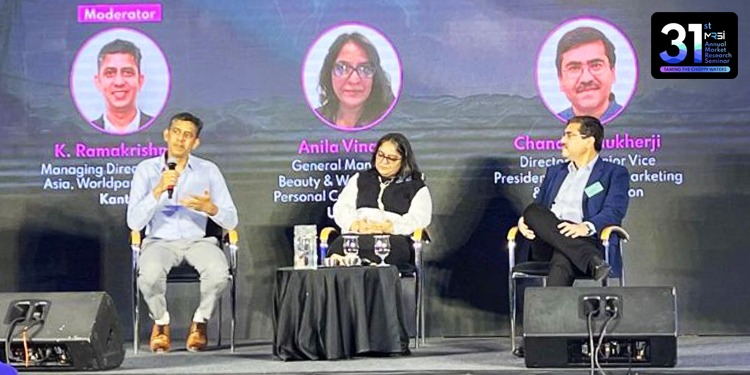‘Taming the choppy waters: Lessons from the world of brands’ was the theme for a discussion at MRSI’s Annual Market Research Seminar in Mumbai on October 9, 2023.
The panel was moderated by K. Ramakrishnan, Managing Director – South Asia, Worldpanel Division, Kantar. Anila Vinayak, General Manager – CMI, Beauty and Personal Care, South Asia at HUL and Chandan Mukherji, Director and SVP – Strategy, Marketing andCommunication, Nestle’ India were the speakers.
The panel opened with Mukherji defining the term ‘choppy waters’ from his perspective: “If you step back a little bit, in the 21st century two nations or two groups of nations are at war. In such a modern, open-minded world if this happens, then there can be nothing choppier. It’s not a short term, it’s a bigger term – there is choppiness if you look at the social, economic or technological scenario. Some of them are positive, add a lot of momentum. Some of the choppiness has issues around them. There are so many areas of choppiness which affect us all the time. While the world has seen different events, you cannot predict them. They just happen and have several repercussions on the world. It affects every element of the marketing mix, people, proposition, pricing etc.”
Vinayak said, “It is just the pace at which markets, categories, and consumers are changing today. And of course the entire digital revolution. The pace of change is leading to a lot of volatility, especially in corporations. The implication is that anything you knew to be true and what you considered your strength may no longer be (hold). That only makes taming of the waters a little more difficult and calls for corporates to change their thinking, sometimes culture and capabilities as well.”
Pace and scale of ‘choppiness’
Citing an example of choppiness faced by Nestle, Mukherji said, “In the Indian context, a crisis we faced was in 2015 which was commonly known as Maggi crisis. All of a sudden the Maggi noodles products were found to be unsafe in some test done somewhere. It created a little frenzy in the media and then different states started doing some form of tests. A few states found issues and few did not. It was moving at such a fast pace.”
He observed that two aspects of choppiness would have accelerated today – the scale and the pace.
“We knew our products. We were sure that there is nothing in our products which could be unsafe for consumers. Tests were again conducted and we got a clean chit from the FDA and we were back in the market in a matter of months. Many customers missed us at that point of time. What is important in all of these are fundamental brand building, the trust the brand generates over a period of time, attention to quality that the brand brings in, etc.”
On the immediate reaction to the issue, Mukherji said, “It was pretty chaotic. The first thing we ensured was whether we were doing things right. We knew everything was right at our end, hence we had the confidence to go back and say everything is right. It is about putting a whole set of people together, the right kind of engagement with the authorities, consumers. We proactively decided to pull back all the products which were in the market, which was not something forced upon us. It was a massive operation. But the brand had the trust and it had all the elements right. We put together consumer sentiment analysis, a systematic way in which data is looked at, the quantum, conversations etc. All this has to be put together in a very short period of time. Thanks to our partners, who helped us to bring all this together and bring a proper structure.”
“We were able to make the right decisions, hence we were able to come back stronger and bigger. Maggi is loved by the country and we were able to increase equity over a period of time. It has a lot of impact on people within the organisation. It’s all about getting together multifaceted people, functions and capabilities in a very synchronous manner within a short period of time, because there are twenty different vectors that are moving around at the same time,” he surmised.
Feedback: [email protected]

















